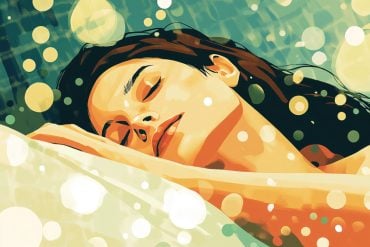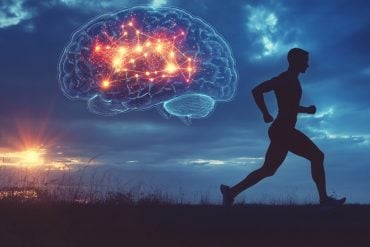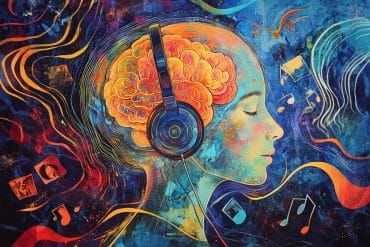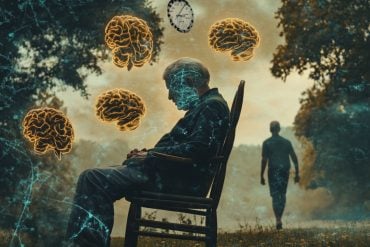Summary: Researchers report adults who sleep six hours per night, as opposed to the recommended eight, have higher chances of waking up dehydrated.
Source: Penn State.
Adults who sleep just six hours per night — as opposed to eight — may have a higher chance of being dehydrated, according to a study by Penn State.
These findings suggest that those who don’t feel well after a night of poor sleep may want to consider dehydration — not simply poor sleep — as a cause, and drink more water.
Results of the study are published in the journal SLEEP on Nov. 5.
Researchers looked at how sleep affected hydration status and risk of dehydration in U.S. and Chinese adults. In both populations, adults who reported sleeping six hours had significantly more concentrated urine and 17-59 percent higher odds of being inadequately hydrated compared to adults who slept eight hours on a regular basis at night.
The cause was linked to the way the body’s hormonal system regulates hydration.
A hormone called vasopressin is released to help regulate the body’s hydration status. It is released throughout the day, as well as during nighttime sleeping hours, which is what the researchers focused on for this study.
“Vasopressin is released both more quickly and later on in the sleep cycle,” said lead author Asher Rosinger, assistant professor of biobehavioral health at Penn State. “So, if you’re waking up earlier, you might miss that window in which more of the hormone is released, causing a disruption in the body’s hydration.”
Dehydration negatively affects many of the body’s systems and functions, including cognition, mood, physical performance and others. Long term or chronic dehydration can lead to more serious problems, such as higher risk of urinary tract infections and kidney stones.
“If you are only getting six hours of sleep a night, it can affect your hydration status,” Rosinger said. “This study suggests that if you’re not getting enough sleep, and you feel bad or tired the next day, drink extra water.”

Two samples of adults were analyzed through the National Health and Nutrition Examination Survey and one sample of adults was analyzed through the Chinese Kailuan Study. More than 20,000 adults were included across the three samples. Participants were surveyed about their sleeping habits, and also provided urine samples which were analyzed by researchers for biomarkers of hydration.
All data is observational and from cross-sectional studies or a cross-sectional wave of a cohort study; therefore, the association results should not be viewed as causal. Future studies should use the same methodology across sites and examine this relationship longitudinally over the course of a week to understand baseline sleep and hydration status, Rosinger said.
Co-authors include Orfeu Buxton, professor of biobehavioral health; Anne-Marie Chang, assistant professor of biobehavioral health; and Xiang Gao, associate professor of nutritional sciences, all at Penn State.
Funding: The study was funded by the College of Health and Human Development at Penn State and the National Natural Science Foundation of China.
Source: Marjorie S. Miller – Penn State
Publisher: Organized by NeuroscienceNews.com.
Image Source: NeuroscienceNews.com image is adapted from the Penn State news release.
Original Research: Abstract for “Short sleep duration is associated with inadequate hydration: Cross-cultural evidence from US and Chinese adults” by Asher Y Rosinger, Anne-Marie Chang, Orfeu Buxton, Junjuan Li, Shouling Wu, and Xiang Gao in Sleep. Published November 5 2018.
doi:10.1093/sleep/zsy210
[cbtabs][cbtab title=”MLA”]Penn State”Shorter Sleep Can Lead to Dehydration.” NeuroscienceNews. NeuroscienceNews, 2 November 2018.
<https://neurosciencenews.com/sleep-dehydration-10158/>.[/cbtab][cbtab title=”APA”]Penn State(2018, November 2). Shorter Sleep Can Lead to Dehydration. NeuroscienceNews. Retrieved November 2, 2018 from https://neurosciencenews.com/sleep-dehydration-10158/[/cbtab][cbtab title=”Chicago”]Penn State”Shorter Sleep Can Lead to Dehydration.” https://neurosciencenews.com/sleep-dehydration-10158/ (accessed November 2, 2018).[/cbtab][/cbtabs]
Abstract
Short sleep duration is associated with inadequate hydration: Cross-cultural evidence from US and Chinese adults
Study Objectives
Short and long sleep duration are linked to reduced kidney function, but little research has examined how sleep is associated with hydration status. Our aim was to assess the relationship between sleep duration and urinary hydration biomarkers among adults in a cross-cultural context.
Methods
Three samples of adults aged 20y were analyzed: 2007–2008 National Health and Nutrition Examination Survey (NHANES; n=4,780), 2009–2012 NHANES (n=9,559), and 2012 cross-sectional wave of the Chinese Kailuan Study (n=11,903), excluding pregnant women and adults with failing kidneys. We estimated multiple linear regression models between self-reported usual night-time sleep duration (<7, 7, 7, 8 (reference), 9 hrs/day) and urine specific gravity (Usg) and urine osmolality (Uosm) as continuous variables and logistic regression models dichotomized as inadequate hydration (>1.020 g/ml; >831 mOsm/kg). In primary analyses, we estimated models excluding diabetes and diuretic medications for healthier sub-populations (NHANES n=11,353; Kailuan n=8,777).
Results
In the healthier NHANES subset, 7 hours was associated with significantly higher Usg and odds of inadequate hydration (adjusted OR: 1.59, 95% CI: 1.25, 2.03) compared to 8 hours. Regression results were mixed using Uosm, but in the same direction as Usg. Among Chinese adults, short sleep duration (<7 and 7 hours) was associated with Usg and higher likelihood of inadequate hydration (7 hours adjusted OR: 1.42, 95% CI: 1.27, 1.70). No consistent association was found with sleeping ≥9 hours.
Conclusions
Short sleep duration was associated with higher odds of inadequate hydration in US and Chinese adults relative to sleeping 8 hours.






